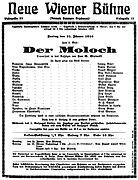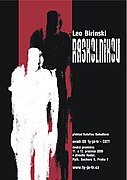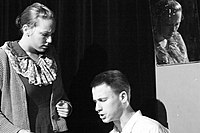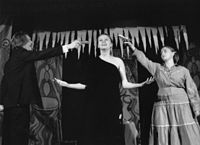Leo Birinsky
Leo Birinsky (* possibly June 8, 1884 in Lysjanka , Russian Empire , today Cherkassy Oblast , Ukraine ; † October 23, 1951 in the Bronx , New York City , New York ) was a playwright , screenwriter and film director of Jewish origin. He has worked in Austria , Germany and the United States . There is only minimal information about Birinski in encyclopedias or dictionaries and hardly any biographical information. The few are either blurry or even wrong. It can almost be stated with certainty that he supported the development of various deceptions to a certain extent.
Surname
Some sources claim that his name was Leo Gottesmann and the name Birinski was just his pseudonym. Both names are probably proper names and correct: on the father's side, Gottesmann, on the mother's side, Birinski. Birinski used his paternal surname until 1906. The oldest document in which the surname on his mother's side appeared for the first time is in a letter from Vienna from October 1908. From then until his death he lived and published under the name Leo Birinski, sometimes with the spelling Birinsky. Other variants of the name: Birinszki or Birinszkij (Hungarian language area), Lev or Lav Birinski (Slavic language area). In the Czech-speaking area it is known under the Russian spelling Lev Birinsky. This has to do with the marketing tactics and the patriotic deception of the National Theater in Prague on the occasion of the premiere of his play Narrentanz in 1912. This satire on Russian conditions by the Jewish author living in Vienna and written in German would probably not have been accepted in the Prague National Theater . Birinski was considered a russian declared writing of Jewish author and his last name was the Russian ending. The poster for the premiere read: "Written in Russian by Lev Birinsky". Czech theater history adopted this mystification and Birinsky was still listed as a Russian author in the Czech Republic at the end of the 20th century . Birinsky himself probably contributed to this through his sympathy for Russia.
Life
Date of birth and place of birth
There are about eight versions of the date and place of birth. According to German and Austrian sources and the Great Jewish National Biography , Birinsky was born in Bukovina - either in the capital Chernivtsi or in the small town of Storoschynez , in 1880 or 1884. According to Czech encyclopedias, he was born in Kiev in the Ukraine in 1885 . According to Billy H. Doyle's The Ultimate Directory of Film Technicians ... it was 1882 somewhere in Russia . Not even Birinski's contemporary personal documents offer a clear answer. In Viennese registration papers, July 1884 was first given as the date of birth and alternately the town of Borszczów or Skała in Galicia as the place of birth. In December 1914, Birinsky suddenly changed his identity and listed (until he finally left Vienna) June 8, 1884 as the date of birth and Lysjanka in Russia (190 km south of Kiev, today's Ukraine) as the place of birth. When he arrived in the United States in September 1927, he identified himself with a Nicaraguan passport at the immigration authorities and cited the port city of Bluefields in Nicaragua as his place of birth . It is not possible today to determine with certainty which of these statements is correct, but some can be excluded. The Jewish personal registers of Chernivtsi and Borszczów have been preserved to this day and deny these cities as Birinski's birthplace. A Nicaraguan identity sounds exotic, but not credible - Birinski drove from Vienna to Berlin in 1921 as a Ukrainian citizen (this can be proven by registration papers). Family circumstances speak for the place of birth Lysjanka. His father Hermann (Hersch) Gottesmann came from Borszczów but married in 1877 in Potschapinzy (10 km from Lysjanka) Czarna Berinska (or Birinska) from Lysjanka. Leo's younger brother Mordko was born there in 1889. Lysiana's personal registers were unfortunately destroyed; therefore this hypothesis remains unconfirmed forever. As for the date of birth, one must rely on the date he cited in connection with Lysyanka - June 8, 1884. The reasons why he changed his identity in December 1914 can only be guessed at. For life in Austria-Hungary it was certainly easier to act as an Austrian citizen from Galicia - apparently he succeeded in convincing the Austrian authorities, perhaps thanks to the provenance of his father Hermann. After the outbreak of World War I , he could feel threatened with being called into the army and therefore it was cheaper to confess his provenance from Lysjanka - which made him a citizen of an enemy state with a permit to stay in Vienna permanently. However, it's just a hypothesis.
Vienna
Little is known about Birinski's early life. Hermann Gottesmann's family lived in the Ukraine until the 1890s and moved to Chernivtsi shortly before the turn of the century (Leo's sister Anna was born there on January 1, 1900). There are two times when Birinski arrived in Vienna. According to contemporary Czech sources it was in 1901, according to his brother Mordko's registration form, the family moved from Chernivtsi to Vienna in July 1904. In Vienna he worked as a sales assistant in the book trade, but soon he found his way into artistic circles and made friends with the actors Hugo Thimig and Josef Kainz , who supported his entry into an artistic career. He began to translate and later to write his own plays. He worked for Kainz in the last phase of his life as his personal secretary and looked after him even during his serious illness until his death in September 1910. According to registration papers, Birinski visited Berlin and Munich from time to time before the First World War , where he probably made further contacts with artists.
Birinski wrote three plays in Vienna. The tragedy Moloch premiered in Vienna in January 1910 and was published three times. Soon afterwards it was performed in Germany and translated into several languages. The drama Raskolnikoff after Dostoyevsky (referred to in some sources as the first work) was also written in 1910, but was not published until 1912 and premiered in Gera in 1913 . At that time it was only translated into Croatian and Slovenian . In 2007 it was also performed in Czech . The most successful piece of this period was the fool's dance . This comedy (according to Birinsky tragicomedy ) premiered on September 28, 1912 in ten cities at the same time and was soon published. Many other performances in German followed (including in November 1912 at the Irving Place Theater in New York City) and a number of translations.
In March 1920, news of Birinski's suicide appeared in the Viennese press, which quickly spread abroad. Soon this turned out to be mistaken for a younger relative from Galicia - Leon Gottesmann. Although the newspapers published a retraction, Birinski's life ends here for many dictionaries. As a result, his person split into two different encyclopedic lemmas - the playwright Birinski "died" in 1920, the filmmaker Birinski appeared "from an unknown place" in the 1920s. The real Birinski left Vienna for good in 1921 and moved to Berlin.
Berlin
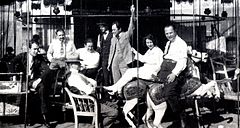
His life in Berlin is more difficult to put together than his stay in Vienna - registration forms from this period have not been preserved. The only written trace is the entry in the registration book of a small hotel in Kloster on the island of Hiddensee , but not even the year is certain. From other documents shows that Birinski in Germany Felicia Ashkenaz (born 1902 in Warsaw married), a pianist of Jewish origin.
In Germany , Birinski devoted himself primarily to film work. He wrote (sometimes with co-authors) scripts for various producers and directors , mostly based on entertainment topics with a tendency towards the trivial. His first proven work was the screenplay for Joe May's "society film" Tragedy of Love (1923) with Emil Jannings , Mia May and Marlene Dietrich in a small role (according to some sources it was about their first listed film). The very next year he took part in the important film The Wax Figure Cabinet (1924, directors : Paul Leni and Leo Birinski). Birinski's part in directing the film is questionable, as a contemporary reviewer noted: “The program reads: Director Paul Leni, game director Leo Birinski. With all due respect: Up until now I have always considered director for game director, game director for director and both to be one and the same. So how is that (...) Let's put it this way: Mr. Lenibirinski together with Mr. Birinskileni (the former director of the game, the latter of the director of the game) designed brilliantly, set gold, but only chiseled silver ... “You can explain Birinski's designation as a film director with the words of the film historian Hans-Michael Bock that "... Leni, who mostly placed the emphasis on visual image design, obviously liked to bring in partners with theater experience to guide the actors." He comments on other tasks of Birinski in this film as follows: "From the connection with his origin (...) I suspect that he acted as a consultant for the Russian episode at the wax museum and as a steward for the Russian financiers (rich emigrants) of the film. ”Some sources mention his part in the script of a Russian episode ( Ivan the Terrible ). Over the next three years, several films per year were made in Germany based on Birinski's scripts . In Varieté (1925, director: EA Dupont ) he is said to have played a small role - at least according to the database of the British Film Institute . As an example for everyone else, we cite scripts for the films by Gennaro Righelli Der Bastard (1925) and Der Meister der Welt (1927) or for Robert Wiene's film Die Geliebte (1927). He processed the theme of the famous spy for the film Mata Hari, the red dancer (1927, director: Friedrich Feher ), which he later revived in the USA. As a screenwriter , he should at the first literary adaptation Winnetou by Karl May participate. Gennaro Righelli was supposed to shoot the film and Wilhelm Dieterle was supposed to play the title role - but the project didn't materialize. According to the correspondence between Birinski and Carl Meinhard , Birinski wrote the play The Holy Devil (Rasputin) before 1927 . Its text in German was not found, but the later version in English exists in the USA .
America
Soon after the premiere of Mata Hari, the red dancer , Birinsky went to the USA . According to the Immigration Service, he traveled on September 16, 1927 on the Berengaria of the Cunard Line from Cherbourg to New York City's Ellis Island . He identified himself with a Nicaraguan passport. He officially came to visit his friend Simon Sutta (a fur merchant from Moscow who lived in Manhattan ). His stay of six months was extended until his death, that is to say by more than 24 years. His wife Felicia - accompanied by her mother - also arrived in Ellis Island on October 28, 1929. Likewise with a Nicaraguan passport and with the aim of visiting Simon Sutta. And that is almost all that is documented about Birinski's stay in the United States . According to the immigration lists, he only left the Americas once when he left for Hawaii for about a week in 1936 . On his return he stated that he was divorced, changed his Jewish nationality to Russian and only remained faithful to Nicaraguan citizenship. From the same source we know of his permanent residence: Hollywood , 3110 Hollyridge Drive. There are no essential information or documents about his life, not even in the library of the Academy of Motion Picture Arts and Sciences , although "he worked on some major films".
Birinski's first American work was probably either the script for the film Love and the Devil (premiere on March 24, 1929, director: Alexander Korda ) or the director of the film Das Große Glück with Rudolph Schildkraut and Louise Dresser - the German version of the film A Ship Comes In by William K. Howard (1928). Two other projects in which he participated were not realized. In Gloria Swanson's estate you can find various script versions of Queen Kelly , begun by Erich von Stroheim but never completed. One of these versions was written by Birinski between March and April 1929. His screenplay was written in German and translated into English by Elzie von Koczian . The second unrealized project was supposed to be the film after “Revolutionary Story ” The Bargain in the Kremlin , whose script Birinsky was supposed to write for Paul Leni. After the Olympia (1930, director: Jacques Feyder , German version of the film His Glorious Night by Lionel Barrymore ) received with embarrassment , several successful and so-called "major" films followed. Birinski began the series with a second adaptation of the spy theme in Mata Hari (1931, director: George Fitzmaurice ) with Greta Garbo in the title role. He continued writing scripts for Rouben Mamoulian's films The Song of Songs (1933), starring Marlene Dietrich and The Gay Desperado (1936). In the meantime he wrote drafts or scripts for some "smaller" films and tried the work of a director again on the film romance Flirtation (1934). At the end of 1936, the press announced that the Motion Picture Association of America, according to Hays Code, would stop work on the film I Gave My Wife to the King about the affair of former British King Edward VIII and Wallis Simpson in the interests of good relations is discontinued with Great Britain . The subject was just proposed by Birinsky. The last films in which Birinski's share as a writer is certain were Full Confession (1939, director: John Farrow ) and The Lady Has Plans (1942, director: Sidney Lanfield ) with Paulette Goddard .
The two Birinski films also served as models for radio plays broadcast by the CBS network as part of the The Lux Radio Theater project . On December 20, 1937, that was The Song of Songs with Marlene Dietrich and Douglas Fairbanks Jr. and on April 26, 1943, The Lady Has Plans with Rita Hayworth and William Powell . The broadcast recordings have been preserved in a private collection to this day.
Birinski also resumed writing for the theater in the United States . In 1935 the drama Nowhere Bound about people deported from the USA was staged on Broadway and in 1944 the play The Day Will Come followed, which deals with the key situation of Adolf Hitler's encounter with Ahasuerus in an abandoned Russian village. In addition, Birinski's typescript of the play The Holy Devil (Rasputin) was found in the estate of Herman Bernstein (he died in 1935) in the English version, which has probably not yet been published or performed. It is still waiting for its world premiere.
Autumn of life
The last seven years of Birinski's life are clouded over again. According to the surviving death certificate, Leo Birinski died on October 23, 1951 in what is now the Lincoln Hospital for the poor in Bronx , New York City. The death certificate contains almost no information about the deceased - only the information that he was 50 (sic!) Years old. So the last official personal document sealed the riddle or the error, completely in the sense of his whole life. Or was it about the last misleading message from this strange man for historiography? You almost want to believe it. In any case, it looks like Leo Birinski died in need and probably very lonely (without relatives and heirs). He was buried in a mass grave in the Potter's Field town cemetery on Hart Island in the Bronx (plot 45, section 2, no. 14). Paul Frank wrote in the Nekrolog: “… Birinski is 69 (sic!) Years old and died of a stroke. He wore (...) His last, heavy, clouded by illness and distress years, with admirable serenity ... "This obituary served as a source for Billy H. Doyle's The Ultimate Directory of Film Technicians ... . In 2009 Birinski's relatives were found in Israel and the USA .
The work
theatre
Poster for the world premiere: The Moloch . New Vienna Stage Vienna: January 21, 1910.
Poster for the world premiere: Raskolnikoff . Princely Court Theater Gera : April 9, 1913.
Poster for the world premiere: Dance of Fools . Lessing Theater Berlin: September 28, 1912.
-
The Moloch, tragedy in three acts (1910). Premiere: January 21, 1910, Neue Wiener Bühne Vienna.
- Other performances in German : Modernes Theater Berlin (1910), Deutsches Theater Köln (1911), Münchner Volkstheater (theater season 1910/1911), Altes Stadt-Theater Leipzig (theater season 1910/1911) etc.
- Translations into:
- Czech : Vincenc Červinka (1910), title Moloch, not listed, printed in 1924.
- Slovenian : Etbin Kristan (1910), title Moloh, performed in Ljubljana (1910), Trieste (1912), Maribor (1925).
- Croatian : August Harambašić (1911), title Moloh, performed in Zagreb (1911).
-
Raskolnikoff (or Raskolnikow ), tragedy in three acts after Dostoyevsky (first mentioned in 1910, printed in 1912). The play based on the novel Guilt and Atonement . Premiere: April 9, 1913, Princely Court Theater Gera .
- Other performances in German : Residenz Theater Berlin (1917), Wiener Kammerspiele (1917).
- Translations into:
-
Dance of Fools, tragic comedy in four acts (1912). Premiere: September 28, 1912, Lessing Theater Berlin.
- The global premiere simultaneously on September 28, 1912: New German Theater Prague, New Vienna Stage , Schauspielhaus Munich , Schauspielhaus Dresden , Schauspielhaus Cologne , City Theater Königsberg (today Kaliningrad ), Schauspielhaus Leipzig , Neues Theater (Frankfurt am Main) and Deutsches Theater Hanover . And one day later for operational reasons: Ostrava City Theater .
- Other performances in German : around 40 performances in many cities in German-speaking countries. On November 13, 1912, the play was also performed at the Irving Place German Theater in New York City.
- The back translation from Czech into German (sic!): Czech director Jiří Vrba and Stephan Stroux (1969), title Mummenschanz . Premiere: September 5, 1971, Volkstheater (Vienna) .
- Translations into:
- Czech : Vincenc Červinka (1912), title Mumraj, performed in the theaters: Národní divadlo Prague (1912), Národní divadlo Brno (1912 on the old stage theater in Veveří street), Maryša amateur theater Prague (1976), Činoherní club Prague ( 1991), Divadlo na Vinohradech in Prague (2009), Činoherní Klub Prague (2017) etc.
- Polish : Jarosław Czesław Pieniążek (1913), title Taniec czynowników, performed in the theaters: Lemberg - Teatr miejski (City Theater, 1913), Krakow (1913 and 1920), Posen (1913), Warsaw (1915), Łódź (1915), Lublin (1915), Płock (1915), Vilnius (1922).
- Slovenian : Anton Melik (1913), title Vrtoglavci, performed in Ljubljana (1913), Nova Gorica (1987).
- Hungarian : Ferenc Herczeg (1913), title Bolondok tánca, performed in Budapest (1913). Miklós Győrffy (1994), title Bolondok tánca; performed in Szeged (1994), Marosvásárhely (1995), Budapest (1998), Pécs (2009). Unknown translator (2002), title Maskarádé, performed in Budapest (2002).
- Danish : Carl Behrens (1913), title Narredans, performed in Copenhagen (1913).
- Dutch : Herman Heijermans (1913), title Narrendans, performed in Amsterdam (1914).
- French : Maurice Rémon (1914), title La Danse des fous, performed in Paris (1914).
- Macedonian : Vladimir Milčin (1980), title Бркотница ( Brkotnica ), listed in Skopje (1980).
- Croatian : Tomislav Lipljin (1982), title Maskerada, listed in Varaždin (1982).
- Serbian : Vida Ognjenović (1988), title Луда игра ( Luda igra ), listed in Nowi Sad (1988).
- Slovak : Martin Porubjak (1991), title Chaos, performed in Bratislava (1991).
- Russian : Oleg Malewitsch and Wiktorija Kamenskaja (2004), title: Хоровод масок ( Chorowod masok ), printed in Baltijskije sesony No. 10/2004, Saint Petersburg , performed as a one-time diploma performance ( Yaroslavl State Institute for Theater Arts , 2010).
- Translations into English and Japanese are also mentioned , but their existence is not proven with certainty.
Photo of the first foreign language performance of the fool's dance (as Mumraj ). Theater Národní divadlo Prague in 1912 (The Revolutionaries).
Photo from the performance of the dance of fools (as Mumraj ). Divadlo na Vinohradech Theater in Prague in 2009 (The Revolutionaries' Vote).
- Just rest! Posse in three acts by Johann Nestroy , arranged for the modern stage by Leo Birinski (printed 1913). Premiere: January 5th, 1914, Deutsches Volkstheater Vienna.
- The holy devil (Rasputin); the play was written in German before 1927, but its text was not found. The typescript of the game in English under the title The Holy Devil (Rasputin), play in three acts, was found in the estate of the journalist and writer Herman Bernstein (1876-1935).
- Nowhere Bound Drama in Three Acts (1935). Premiere: January 22nd, 1935, Imperial Theater, New York City. Director: Archimedes H. van Buren.
- The Day Will Come, play in three acts (1944). Premiere: September 7th, 1944, National Theater, New York City. Directed by Lee Elmore.
Filmography
|
|
literature
- Hans-Michael Bock (Ed.): CineGraph - Lexicon for German-language film . edition text + kritik, Munich, 50th delivery (March 2011), ISBN 978-3-86916-130-3 .
- Enciclopedia dello spettacolo . 2nd edition. Casa editrice Le Maschere, Rome 1954 (Italian).
- Salomon Wininger : Great Jewish National Biography. Second volume. Cernăuti [Chernivtsi] 1925–1936.
- Billy H. Doyle: The Ultimate Directory of Film Technicians [ … ] Lanham (Maryland) / Folkestone 1999 (English).
- Dušan Hübl: Lev Birinskij - životopisný mumraj. Prague 2004–2010 (Czech).
Web links
- Leo Birinski in the Internet Movie Database (English)
- Literature by and about Leo Birinski in the catalog of the German National Library
- Broadway - Leo Birinski in the Internet Broadway Database .
- WorldCat1 , WorldCat2 - Leo Birinski in the WorldCat meta catalog (English).
- KinoTV by Unicorn Media - European database for film and TV.
- Amateur theater Esence - research after Birinsky (Czech).
Individual evidence
- ^ Institute for Theater Studies (archive), Free University of Berlin .
- ↑ a b National Theater Praha - website of the performance (Czech).
- ↑ Umění a věda. Mumraj Národního divadla. In: Vídeňský Denník. Vienna October 5, 1912 (Czech)
- ^ Archives of the National Theater , Prague.
- ↑ a b c d e Vienna City and State Archives , Vienna.
- ↑ a b c d Ancestry.com - Genealogical Web.
- ↑ Derzhawnij archiv Tschernivetskoj oblasti, Chernivtsi , Ukraine .
- ↑ Archivum Główne act Dawnych, Warsaw.
- ↑ Magistrate of the City of Vienna - Department 35 “Immigration, Citizenship, Registry Office”, Vienna.
- ↑ a b The Fool's Game Acted . In: The New York Times . November 14, 1912, p. 11 (English, nytimes.com ( Memento from November 11, 2012 in the Internet Archive ) [PDF; 61 kB ; accessed on April 25, 2019] review).
- ↑ The suicide of the writer Birinsky. In: Neues Wiener Tagblatt . Vienna March 21, 1920.
- ↑ The suicide of the writer Gottesmann. In: Neues Wiener Tagblatt. Vienna March 23, 1920.
- ^ WL: Film-Kurier . No. 270, Berlin November 14, 1924.
- ^ BFI - Web of the British Film Institute (English).
- ^ KMG - Karl May Society .
- ^ KMG - Karl May Society.
- ^ Correspondence Birinski - Meinhard: Theater Studies Collection of the University of Cologne, Cologne.
- ^ Harry Ransom Humanities Research Center, University of Texas at Austin .
- ↑ Hays Bars Edward Film. In: The New York Times. New York City December 16, 1936 (English).
- ↑ RadioGOLDINdex - catalog search (English).
- ↑ Herman Bernstein Papers - typescript: Series VI, subseries 17, box 57, no.948 (English).
- ^ Office of Vital Records, Department of Health and Mental Hygiene, New York City.
- ^ Municipal Archives, New York City.
- ↑ Leo Birinsky. In: Structure . New York City December 7, 1951, p. 12.
- ^ Lev Berinskij, Jiří Vrba, Stephan Stroux : Mummenschanz. Universal Edition, Vienna 1969, DNB 572256507 .
- ↑ Mummery. (PDF) Part archive Volkstheater Vienna 1952–1999. (No longer available online.) P. 18 , formerly in the original ; Retrieved April 25, 2019 (author as Leo Berinsky; no mementos). ( Page no longer available , search in web archives ) .
- ↑ Jan Michalik (Ed.): Stanisław Hałabuda (Red.): Dramat obcy w Polsce 1765–1965: premiery, druki, egzemplarze. Volume 1: A-K. Księgarnia Akademicka, Kraków 2001, ISBN 83-7188-381-1 (Polish).
| personal data | |
|---|---|
| SURNAME | Birinsky, Leo |
| ALTERNATIVE NAMES | Man of God, Leo |
| BRIEF DESCRIPTION | Russian-American playwright, screenwriter and also film director of Jewish origin |
| DATE OF BIRTH | uncertain: June 8, 1884 |
| PLACE OF BIRTH | Lysjanka , Russian Empire |
| DATE OF DEATH | October 23, 1951 |
| Place of death | Bronx , New York City, New York , United States |

